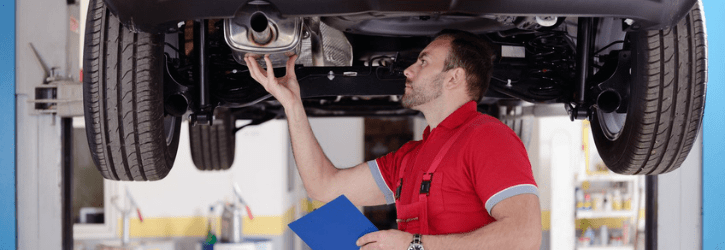Category: Automotive

Britax recalls over 207,000 infant car seats due to a choking risk
Manufacturer of car seats and strollers, Britax, are reportedly recalling a number of their infant car seats as the chest clip between the safety straps may be a choking hazard.
Affected models of infant car seats include the B-Safe 25, BOB B-Safe 35; and the 35 Elite.
It’s thought that the recall is limited to models manufactured between 1st November 2015 and 31st May 2017, and it’s thought to be a pre-emptive one as no injuries have been reported so far.
Continue Reading…

German financial authorities to investigate major car makers over suspected cartel
The Federal Financial Supervisory Authority (BaFin) for Germany has confirmed with German newspaper, Handelsblatt, that they will indeed be “examining whether VW and Daimler respected their duty to inform markets following their allegedly reporting themselves to the authorities” of alleged wrongdoing.
On top of that, Volkswagen and Daimler have reportedly admitted to colluding amongst themselves and other carmakers to discuss sensitive business topics. In exchanging such information and advice, the car makers may be guilty of creating a cartel, which is prohibited in EU law as they can be harmful to the market and its consumers.
Continue Reading…

Honda recalls over 24,000 cars after manufacturing defect may cause risk of fuel leak
Honda has issued a voluntary recall for 24,000 cars over concerns that its fuel supply pipes may not be connected properly, or may come apart, and may therefore leak fuel; and pose a risk of fire.
The two models involved in the recall are:
- AWD Honda CR-V Touring
- 2WD Honda CR-V
If the pipes disconnect, flow of fuel could be disrupted, leading to the engine stalling and therefore increasing the risk of an accident. On top of that, as with any fuel leak, there is a risk of fire as well.
Continue Reading…

Who is to blame for Tesla car crash in Minnesota?
A 58-year-old driver of a Tesla car was involved in a car crash in Minnesota on the 17th July 2017. The high tech vehicle, produced by Elon Musk’s Tesla car company, is installed with ‘self-driving’ technology that’s designed to assist drivers in their journeys with automatic driving capabilities.
However, they’ve come under huge scrutiny after a number of incidents have led to crashes that have fuelled calls that the technology just isn’t ready yet; and certainly isn’t safe.
In this incident, police authorities reported that the driver had “engaged the self-driving mode” when it “suddenly accelerated, causing the car to leave the road and overturn”.
So, was this human error or technological error?
Continue Reading…

Takata files for bankruptcy as a result of exploding airbag scandal
The Takata airbag recall is one of the biggest automotive recalls in history. The company started producing airbag inflators in the late 1990s, and around the year 2000, Takata discovered some of their airbag inflators weren’t functioning properly, and even found some had erupted during tests.
The first recorded incident reportedly happened in May 2004 where a driver’s side bag ruptured in a Honda Accord. It was not until half a decade later that Honda recalled more than 500,000 airbags for the defect to be rectified, and regulators didn’t start investigations until June 2014.
Now, the scale of the issue has resulted in the Japanese manufacturer filing for bankruptcy.
Continue Reading…

Exploding Takata airbags: many millions involved in recalls
There have been multiple calls to get Takata inflators out of vehicles and off the roads for several years, and after a crash where a Takata airbag reportedly nearly caused a woman’s death, these calls are getting louder.
Karina Dorado’s trachea was reportedly punctured by shrapnel from a Takata inflator. The crash, which happened on 3rd March 2017 in Las Vegas, should’ve been just a minor collision, but things escalated quickly. Ms Dorado was rushed into a trauma centre where surgeons removed pieces of the airbag device that had damaged her vocal cords.
She is still being treated for neck injuries.
Continue Reading…

Maserati, BMW and Mercedes-Benz vehicles recalled after fire risk
Fire risks in vehicles appear to be a growing phenomenon. Several manufacturers have voluntarily recalled vehicles for fire risks recently, and it’s not a thing to be dismissed lightly.
Imagine a vehicle cruising at 70mph on the motorway when it suddenly sets on fire. It’s a clear recipe for disaster and could endanger many lives, including your own.
In recent news, Maserati, Mercedes-Benz and BMW have all recalled vehicles for reported risks of fire…
Continue Reading…

VW / Audi recalls approx 600,000 Audi vehicles in the U.S. for airbag and coolant pump problems
VW and Audi’s troubles extend beyond the ongoing emissions scandal as both makers have had to recall vehicles for some fairly high-risk problems.
An estimated 576,000 vehicles and SUVs are under a recall for two problems associated with the vehicles: one is for airbag defects, which can be obviously very dangerous for road users, and the second is for coolant pumps problems that may overheat and cause fires.
Both are potentially very dangerous.
Continue Reading…

Honda may be on the brink of a recall as multiple customers come forward complaining of gas fumes in the cabin.
Many Honda customers have taken to the internet to complain of unpleasant gasoline fumes filling the cabins of their 2015, 2016 and 2017 Honda CR-Vs.
Complaining drivers and passengers are reportedly unable to withstand the strong stench whilst also fearing that respiratory problems are to follow on from coughing and burning sensations experienced when inhaled.
We all know exhaust fumes can be toxic – so this could be serious.
Continue Reading…

BMW agree to settle $478 million (£382 million) in water-damage lawsuit
In the U.S., more than 300,000 BMW owners have been granted their portion from a $478 million (£382 million) settlement over allegations that a technical defect can cause water damage to components in some BMW vehicles.
The lawsuit claimed BMW knew about the issue for years but didn’t do anything to rectify the problem until vehicle owners reported concerns. The water damage allegedly interfered with the vehicle’s Micro Power Module which was placed under the spare tyre, and this allegedly had a knock-on effect on the lights, speedometer and windscreen wipers.
The fact that the module reportedly wasn’t isolated can make the electronic component vulnerable when in contact with liquids.
Continue Reading…

“This is the worst car purchase I have ever made” – 4×4 Range Rover owner warns others against buying the vehicle
Range Rovers are often seen as a dream for many. However, one retired couple’s dream quickly turned into a nightmare, and the victims have warned others against purchasing the Range Rover Evoque that’s at the centre of their problems.
Trevor and Ann Heley splashed out £44,400 on what they thought was going to be a reliable car given the reputation Range Rovers have. However, after owning it for two years, they say they have had enough of the problems that have reportedly come with the vehicle.
Continue Reading…

Toyota recalls over 72,000 vehicles after safety concerns over sensitive resin bumpers
Japanese car brand Toyota are set to be recalling a total of 72,847 vehicles after concerns that overly sensitive resin bumpers may pose a safety risk to users. The recalls affect the newer 2016 and 2017 Tundra models.
The safety defect lies within the resin made step bumpers and resin reinforced brackets on the corners of the vehicle. Any impact made to the resin bumpers may not always reveal visible damage, but if stepped on, it could break way entirely or in part; risking injury to the user.
Continue Reading…